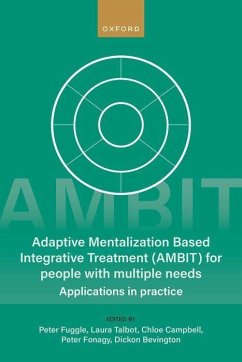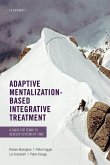Adaptive Mentalization-Based Integrative Treatment (Ambit) for People with Multiple Needs
Applications in Practise
Herausgeber: Fuggle, Peter; Bevington, Dickon; Fonagy, Peter; Campbell, Chloe; Talbot, Laura
Adaptive Mentalization-Based Integrative Treatment (Ambit) for People with Multiple Needs
Applications in Practise
Herausgeber: Fuggle, Peter; Bevington, Dickon; Fonagy, Peter; Campbell, Chloe; Talbot, Laura
- Broschiertes Buch
- Merkliste
- Auf die Merkliste
- Bewerten Bewerten
- Teilen
- Produkt teilen
- Produkterinnerung
- Produkterinnerung
AMBIT has been developed to help people with multiple needs including mental health. This book shows how it has been applied in social settings to provide help through practical use and case study. It describes recent developments in the AMBIT model and provides new thinking about how "helping" services can provide meaningful help and change.
Andere Kunden interessierten sich auch für
![Adaptive Mentalization-Based Integrative Treatment Adaptive Mentalization-Based Integrative Treatment]() Dickon Bevington (Consultant in Child and Adolescent Psychiatry andAdaptive Mentalization-Based Integrative Treatment58,99 €
Dickon Bevington (Consultant in Child and Adolescent Psychiatry andAdaptive Mentalization-Based Integrative Treatment58,99 €![Mentalization Based Treatment for Personality Disorders Mentalization Based Treatment for Personality Disorders]() Anthony Bateman (Consultant Psychiatrist and Psychotherapist and MBMentalization Based Treatment for Personality Disorders47,99 €
Anthony Bateman (Consultant Psychiatrist and Psychotherapist and MBMentalization Based Treatment for Personality Disorders47,99 €![Cambridge Guide to Mentalization-Based Treatment (MBT) Cambridge Guide to Mentalization-Based Treatment (MBT)]() Anthony Bateman (Anna Freud National Centre for Children and FamiliCambridge Guide to Mentalization-Based Treatment (MBT)52,99 €
Anthony Bateman (Anna Freud National Centre for Children and FamiliCambridge Guide to Mentalization-Based Treatment (MBT)52,99 €![Mentalization-Based Treatment with Families Mentalization-Based Treatment with Families]() Eia Asen (LondonMentalization-Based Treatment with Families52,99 €
Eia Asen (LondonMentalization-Based Treatment with Families52,99 €![Not Just Bad Kids Not Just Bad Kids]() Not Just Bad Kids152,99 €
Not Just Bad Kids152,99 €![The Mentalization Guidebook The Mentalization Guidebook]() Janne Oestergaard HagelquistThe Mentalization Guidebook91,99 €
Janne Oestergaard HagelquistThe Mentalization Guidebook91,99 €![Mentalization-Based Treatment for Adolescents Mentalization-Based Treatment for Adolescents]() Mentalization-Based Treatment for Adolescents30,99 €
Mentalization-Based Treatment for Adolescents30,99 €-
-
-
AMBIT has been developed to help people with multiple needs including mental health. This book shows how it has been applied in social settings to provide help through practical use and case study. It describes recent developments in the AMBIT model and provides new thinking about how "helping" services can provide meaningful help and change.
Hinweis: Dieser Artikel kann nur an eine deutsche Lieferadresse ausgeliefert werden.
Hinweis: Dieser Artikel kann nur an eine deutsche Lieferadresse ausgeliefert werden.
Produktdetails
- Produktdetails
- Verlag: Oxford University Press
- Seitenzahl: 384
- Erscheinungstermin: 7. Juni 2023
- Englisch
- Abmessung: 232mm x 154mm x 22mm
- Gewicht: 586g
- ISBN-13: 9780198855910
- ISBN-10: 0198855915
- Artikelnr.: 67147935
- Herstellerkennzeichnung
- Libri GmbH
- Europaallee 1
- 36244 Bad Hersfeld
- gpsr@libri.de
- Verlag: Oxford University Press
- Seitenzahl: 384
- Erscheinungstermin: 7. Juni 2023
- Englisch
- Abmessung: 232mm x 154mm x 22mm
- Gewicht: 586g
- ISBN-13: 9780198855910
- ISBN-10: 0198855915
- Artikelnr.: 67147935
- Herstellerkennzeichnung
- Libri GmbH
- Europaallee 1
- 36244 Bad Hersfeld
- gpsr@libri.de
Peter Fuggle PhD is a clinical psychologist who has worked in child mental health services for over thirty years. He was Clinical Director of a community based mental health service in London for 20 years and became concerned about young people with mental health needs who did not wish to attend mainstream services. His collaboration with Dickon Bevington at the Anna Freud Centre was a turning point of his career and resulted in the start of the AMBIT programme. He is now delighted to be part of a growing AMBIT team in London who together continue to evolve the approach. Laura Talbot is a Clinical Psychologist who has specialised in working with adolescents and young adults in community outreach services since 2010. Laura has held clinical lead roles in multi-agency projects with MAC-UK and Brent Inclusion Services. Laura has been a trainer with the AMBIT Programme since 2015 and is now the AMBIT Joint Programme Lead. Chloe Campbell is Deputy Director of the Psychoanalysis Unit at University College London. She was educated at Cambridge, LSE and SOAS. She is interested in pursuing the interdisciplinary implications of recent theoretical developments in the area of epistemic trust, culture and psychopathology. Peter Fonagy is Head of the Division of Psychology and Language Sciences at University College London and is Chief Executive of the Anna Freud National Centre for Children and Families. He is a Fellow of the British Academy, the Academy of Medical Sciences, the Academy of Social Sciences and the American Association for Psychological Science, and was elected to Honorary Fellowship by the American College of Psychiatrists. He has received Lifetime Achievement Awards from several national and international professional associations including the British Psychological Society, the International Society for the Study of Personality Disorder, the British and Irish Group for the Study of Personality Disorder, the World Association for Infant Mental Health and was in 2015 the first UK recipient of the Wiley Prize of the British Academy for Outstanding Achievements in Psychology by an international scholar. Dickon Bevington is Medical Director at the Anna Freud National Centre for Children and Families. He is also a Consultant Child and Adolescent Psychiatrist in Cambridgeshire and Peterborough NHS FT where he leads CASUS, an outreach service for complex substance-using youth, and he is also a Fellow of the Cambridge and Peterborough CLARHC.
* 1: Why Has AMBIT Come About?
* 2: An Introduction to AMBIT
* 3: Epistemic Trust and Mistrust in Helping Systems
* 4: Working Out What is Going On: Using the AIM Cards with Clients
* 5: Getting Started With AMBIT: The ECID Project in Barcelona
* 6: Connecting Psychotherapy to the Streets: The Malmö Approach
* 7: AMBIT for Adults With Severe Personality Disorders: Experience
from Utrecht, the Netherlands
* 8: Enhancing Multiprofessional Cooperation In a Child and Youth
Social Service Institution: Vorarlberger Kinderdorf, Austria
* 9: Creating and Supporting a Team Around the Worker
* 10: Working with Networks: Implementing AMBIT in Disrupted Healthcare
Systems
* 11: Applying AMBIT to Teacher Training: Innovations in Germany
* 12: Applying AMBIT Principles to the Training Process
* 13: Adopting a Mentalizing Approach to Evaluating Outcomes
* 14: What Are The Future Directions For AMBIT?
* 2: An Introduction to AMBIT
* 3: Epistemic Trust and Mistrust in Helping Systems
* 4: Working Out What is Going On: Using the AIM Cards with Clients
* 5: Getting Started With AMBIT: The ECID Project in Barcelona
* 6: Connecting Psychotherapy to the Streets: The Malmö Approach
* 7: AMBIT for Adults With Severe Personality Disorders: Experience
from Utrecht, the Netherlands
* 8: Enhancing Multiprofessional Cooperation In a Child and Youth
Social Service Institution: Vorarlberger Kinderdorf, Austria
* 9: Creating and Supporting a Team Around the Worker
* 10: Working with Networks: Implementing AMBIT in Disrupted Healthcare
Systems
* 11: Applying AMBIT to Teacher Training: Innovations in Germany
* 12: Applying AMBIT Principles to the Training Process
* 13: Adopting a Mentalizing Approach to Evaluating Outcomes
* 14: What Are The Future Directions For AMBIT?
* 1: Why Has AMBIT Come About?
* 2: An Introduction to AMBIT
* 3: Epistemic Trust and Mistrust in Helping Systems
* 4: Working Out What is Going On: Using the AIM Cards with Clients
* 5: Getting Started With AMBIT: The ECID Project in Barcelona
* 6: Connecting Psychotherapy to the Streets: The Malmö Approach
* 7: AMBIT for Adults With Severe Personality Disorders: Experience
from Utrecht, the Netherlands
* 8: Enhancing Multiprofessional Cooperation In a Child and Youth
Social Service Institution: Vorarlberger Kinderdorf, Austria
* 9: Creating and Supporting a Team Around the Worker
* 10: Working with Networks: Implementing AMBIT in Disrupted Healthcare
Systems
* 11: Applying AMBIT to Teacher Training: Innovations in Germany
* 12: Applying AMBIT Principles to the Training Process
* 13: Adopting a Mentalizing Approach to Evaluating Outcomes
* 14: What Are The Future Directions For AMBIT?
* 2: An Introduction to AMBIT
* 3: Epistemic Trust and Mistrust in Helping Systems
* 4: Working Out What is Going On: Using the AIM Cards with Clients
* 5: Getting Started With AMBIT: The ECID Project in Barcelona
* 6: Connecting Psychotherapy to the Streets: The Malmö Approach
* 7: AMBIT for Adults With Severe Personality Disorders: Experience
from Utrecht, the Netherlands
* 8: Enhancing Multiprofessional Cooperation In a Child and Youth
Social Service Institution: Vorarlberger Kinderdorf, Austria
* 9: Creating and Supporting a Team Around the Worker
* 10: Working with Networks: Implementing AMBIT in Disrupted Healthcare
Systems
* 11: Applying AMBIT to Teacher Training: Innovations in Germany
* 12: Applying AMBIT Principles to the Training Process
* 13: Adopting a Mentalizing Approach to Evaluating Outcomes
* 14: What Are The Future Directions For AMBIT?








